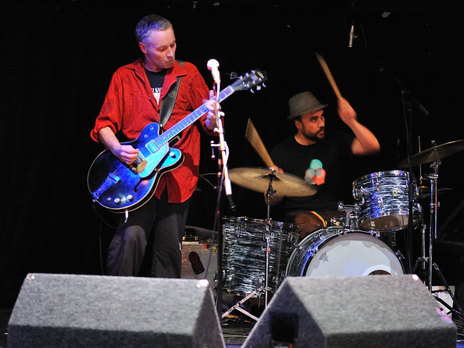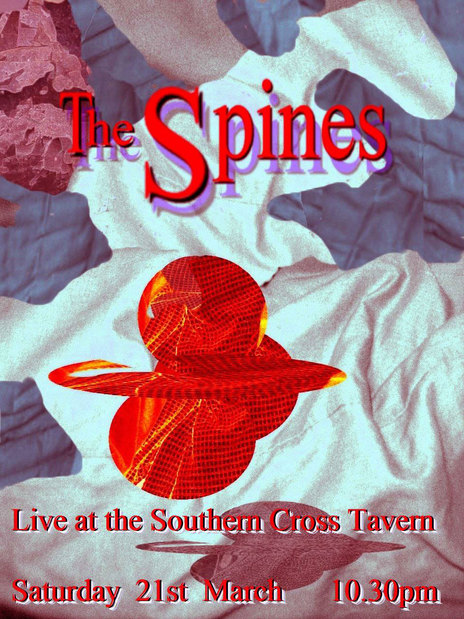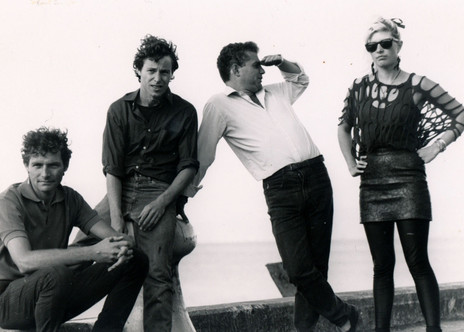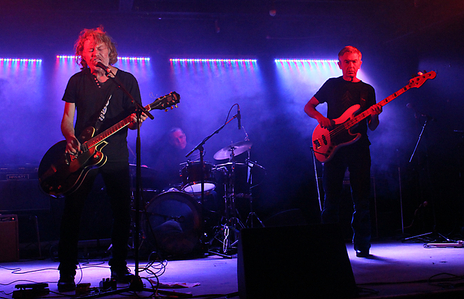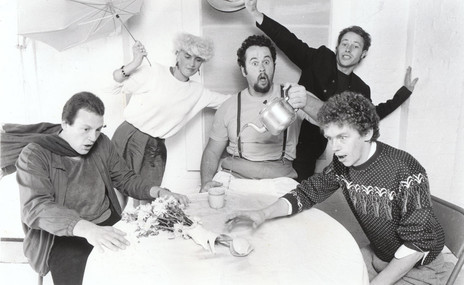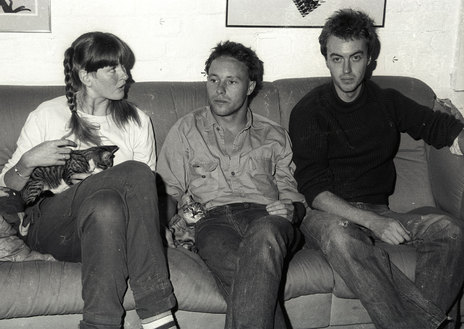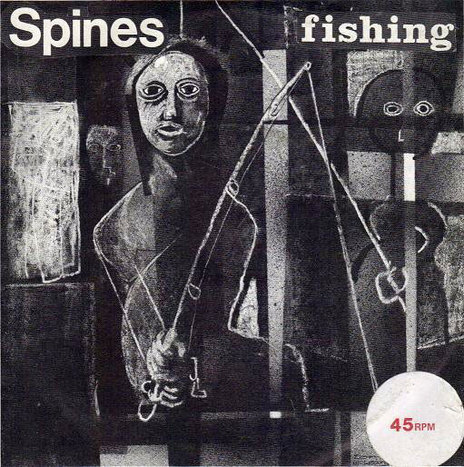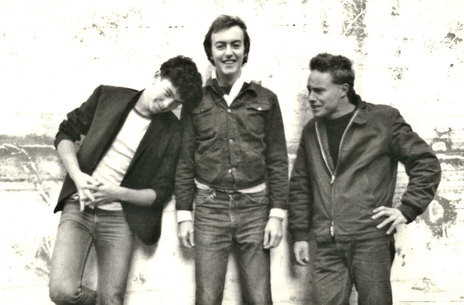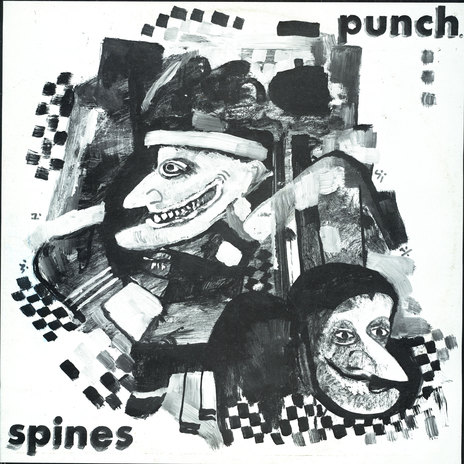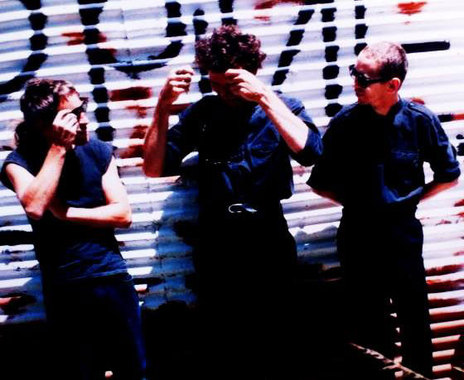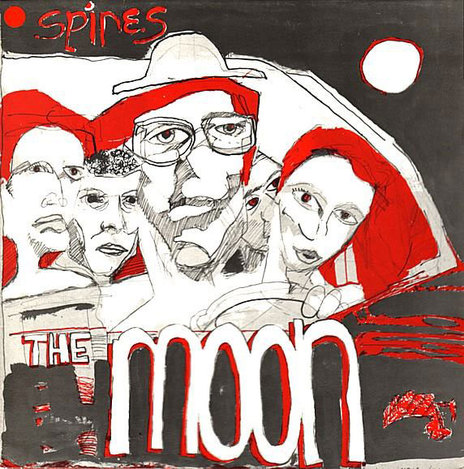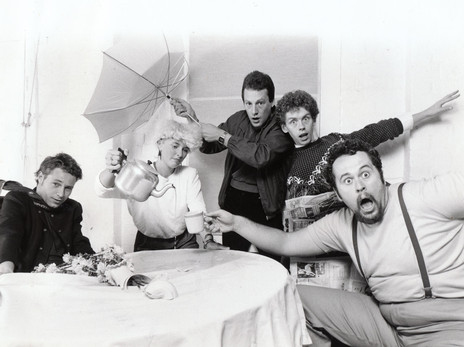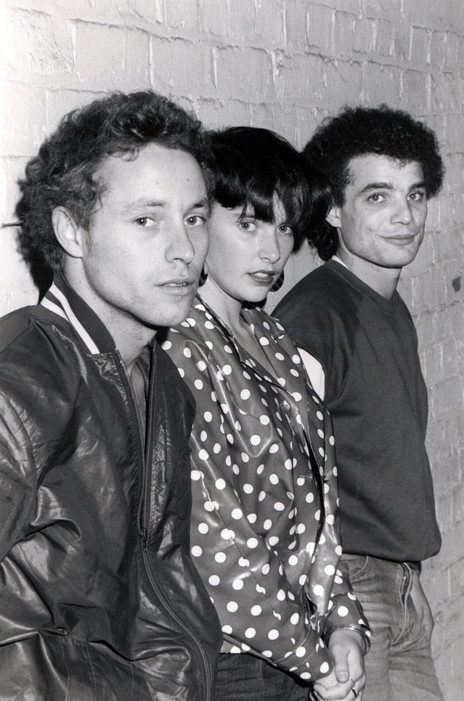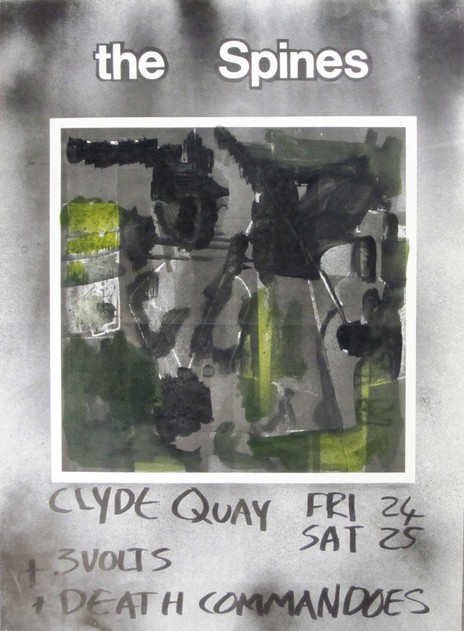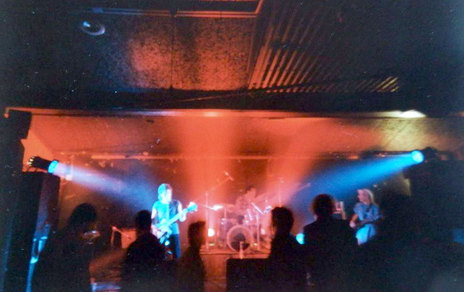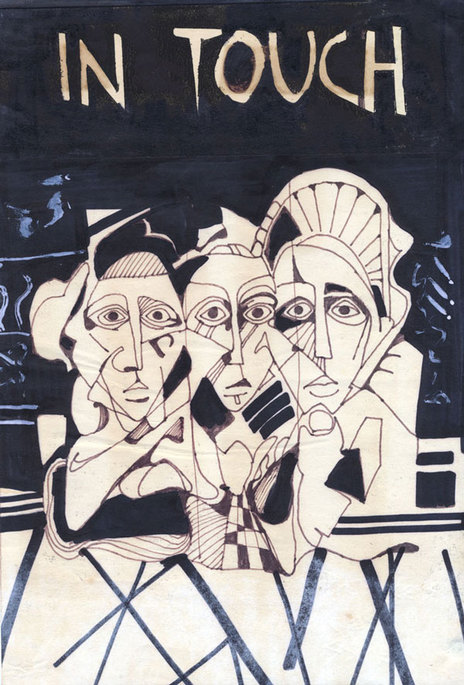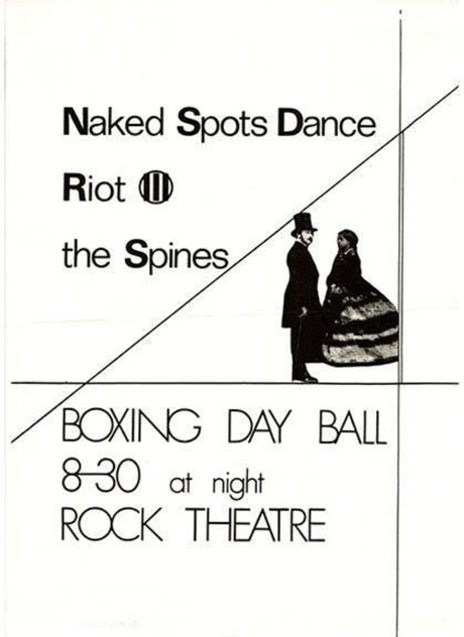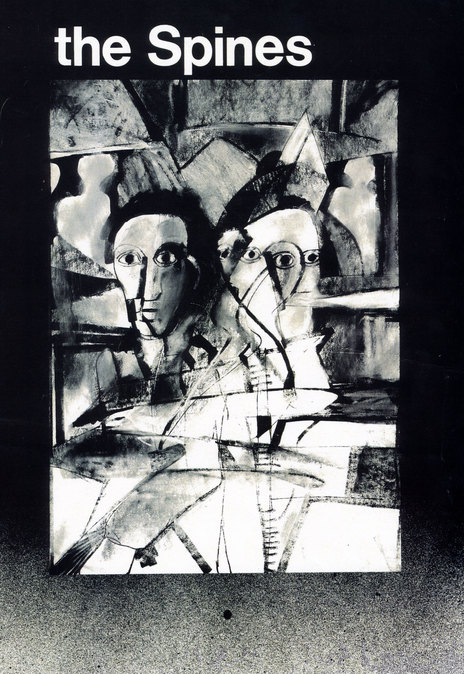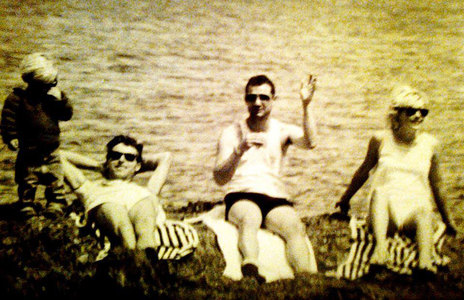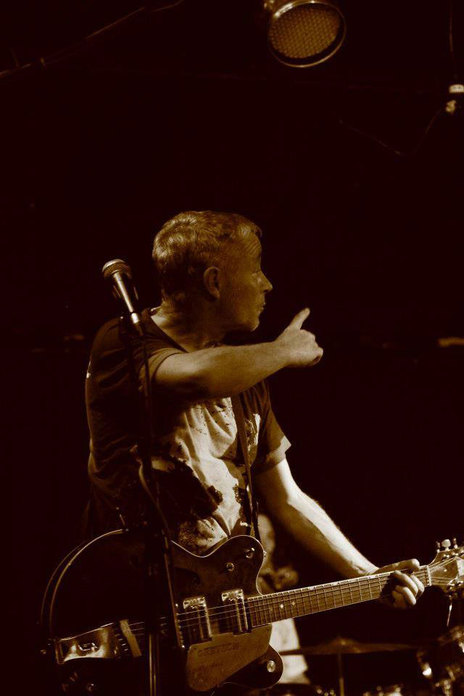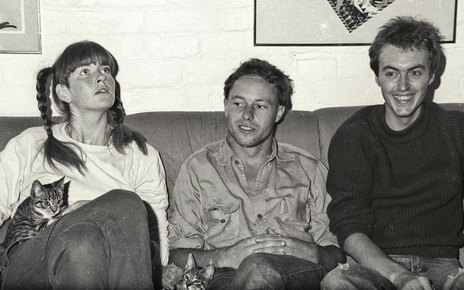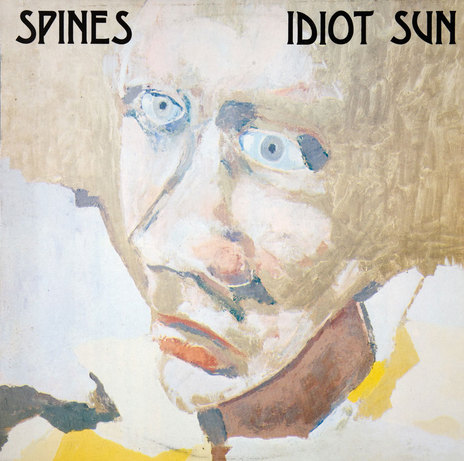Along the way, the Spines produced at least one bona fide classic that TV current affairs man John Campbell names as his all-time favourite New Zealand song: ‘Your Body Stays’. And along the way, they recorded for three notable labels (Bryan Staff’s iconic but short-lived Ripper, Jim Moss’s Jayrem and Roger Shepherd’s Flying Nun), and toured the land to rousing receptions they never quite received in their hometown.
It all began in Hamilton, where Jon McLeary was born and schooled in the suburb of Hillcrest. It was at a party in Hamilton that he met Louise Loft, with whom he formed the duo Negative Theatre. With his songs sprouting everywhere and her beguiling voice to sing them, the duo landed gigs all over the country, including 1979’s massive hippie festival, Nambassa. By January 1980, the duo had moved to Wellington. While neither the relationship nor Negative Theatre would last, McLeary adopted the capital city, which clicked with its fervent post-punk music underground and thriving theatre and arts scenes.
Despite its frequent excellence, the band always seemed either two steps ahead, or several steps sideways, of any scene or specific style.
And that’s the thing: you just can’t write about Jon McLeary and his Spines without mentioning those other aspects of his artistic endeavour that go some way to filling in the picture, if never quite defining him. Apart from being a singer-songwriter with an eclectic set of influences that would make his own music impossible to pin down, he is also an accomplished visual artist (all Spines releases are draped in his artwork) and a sometime actor who quickly became involved with local repertory companies including Downstage Theatre.
While his interest in the visual arts and drama already set him somewhat apart from the monomaniacal nihilism of the Terrace scene post-punk bands, it made for an awkward fit in 1981 when the Spines was born. Despite its frequent excellence, the band always seemed either two steps ahead, or several steps sideways, of any scene or specific style.
McLeary explains in his excellent ongoing non-chronological memoir The Ghost Of Electricity (view it online at Off The Tracks), that when Negative Theatre imploded, he formed a band with Barton Price (drums) and Jonathan Schwartz (bass). That union was nipped in the bud when they were both snapped up by The Crocodiles.
Working at the Arts Centre in Willis St, McLeary then met Caroline Easther (drums) and Rob Mahoney (bass) of jazz-swing band The Hot City Cats, and the Spines was born. They were serious musicians who demanded a new song at every rehearsal, “and I had to raise my game”. But what of the name? Asked to come up with one at the group’s first gig at “a lunchtime rave at Victoria University Student Union Hall during orientation week”, McLeary looked down at the song list and chose the third song, called 'The Spines'. It stuck.
By June 1982, they had a debut 7-inch EP out on Bryan Staff’s Ripper label (Staff was living in Wellington at the time in a giant warehouse under which the group practised) which introduced them musically as a ska-punk band with a touch of slightly mournful folk-rock thrown in for good measure, together with a musicality singularly lacking in the rock underground of the time.
The Fishing EP was well received, demonstrating McLeary’s ability with a poignant line, together with a New Zealand turn of phrase and an economy of words along with what one pundit at the time described as a kind of New Zealand gothic-folk feel. But it also raised the dilemma that they were neither part of the post-punk underground, nor at one with the Pelicans/ Holidaymakers axis of would-be Jimmy Buffetts.
“We did have problems in that way,” McLeary tells me. “Most of us were from out of town and trying out feels that weren't Little Feat or Sex Pistols. We were defiantly post-punk/ ska in the early days, with the folk hangover I kept going back to. I always felt like an outsider yet most of the musos from all sides respected me for my integrity and originality and the songs. It did seem like the Nick Bollinger bands and the Beat Rhythm Fashion set got all their old mates to their gigs and we had to build an audience. Plus we kept on changing – never sitting in one thing too long.”
He’s not wrong. From the group’s first release in 1982 to their last in 1986, the Spines’ sound was only really defined by McLeary’s distinctive vocals (and vowel-shapes) and his Gretsch, while the ever-evolving group betrayed its restlessness by never staying in the same place for long.
For the 12-inch ‘Punch’ in March 1983 (also on Ripper) Caroline Easther had left to join Beat Rhythm Fashion and Tim Robinson (The Rodents, The Hulamen) had taken over drum duties, but the big change was explicit in the detail rendered by the production (Ian Morris, Andy Drey) and the B-side that has subsequently become something of an anthem: the emotionally gutting ‘Your Body Stays’.
Probably the most consistently great Spines recording is what came next. The Act Your Age EP (1984) was the product of adversity, when practically the whole band once again walked out on McLeary, leaving him to make a haunting six-song set more or less on his lonesome, with just a little help from producer Gregory Brice (drums) and Ross Burge (also on drums). McLeary freely admits that he still loves Act Your Age, and that’s not surprising: its spatial noir-folk is as moody and effective as anything by more celebrated shoegazers of the era (think Marine Girls or early Cocteau Twins), and its nagging riffs and anger prevent it from ever getting indulgent or disappearing up its atmospheric vapours.
Just a year later, however, a familiar line-up (Burge, Calder, Duncan and McLeary) convened for the group’s debut album, The Moon, recorded for some bizarre reason at Gisborne’s Capture Studios, and sounding like it. While the quality of the writing and playing are fine, the record is hampered by a thin sound that fails to properly separate out the group’s increasingly complicated arrangements, although it does contain the near-classic ballad, ‘Lily And I’.
The group’s final fling for many years was commissioned by Flying Nun in 1986, although reportedly, the label were disappointed with the result. It’s easy to see why. Idiot Sun is a great record, actually, and boasts a big, pungent production by Gordons/ Bailter Space drummer Brent McLachlan. But Ross Burge, Wendy Calder and (particularly) sax player Neill Duncan (formerly of the Primitive Art Band) are real musicians’ musicians, and the album, although clearly a singer-songwriter rock hybrid, is at times dazzlingly complex in its constructions – something more akin to jazz than strummy rock-folk.
McLeary still smarts about the lack of promotion or recognition Idiot Sun was accorded, and he’s understandably wary of record labels, none of which have bothered to reissue anything in the digital era, or even tell him whether the original tapes still exist.
“It’s very strange – Flying Nun, Jayrem and Ripper all have websites and the Spines don’t get a mention on any of them.”
McLeary says that there was no real fan base at the time, but that somehow he had simply willed the project on; he acknowledges the musical debt he owes to former Spines players, “who influenced my writing and playing, were all way more accomplished players than me, and raised my game in terms of what I thought we could accomplish.”
The Spines went through a period of inactivity after Idiot Sun, but a new version featuring the group’s former sax man Neill Duncan as drummer emerged in the early 1990s, and it was this unit that recorded the album A Snakelike Life. Purportedly much simpler in structure and honed down to show off the songs’ strengths, the album was never released. Anthony Donaldson (another former Primitive Art Group member), Andy Craig (aka Andy Drey, The Steroids, The Body Electric) and later, returning drummer Tim Robinson would hold the rhythm together as the decade wore on.
A fluid lineup of the Spines has chugged on in the 21st century as a sought-after live unit with a substantial catalogue of original songs to call on in a 90-minute set. The Spines are even the chief inspiration for the annual Easter Wairarapa music festival, Tora Tora Tora.
McLeary repeatedly stated that “there’s an album ready to record” but it wasn't until August 2017 that Epidural was issued on his own Forgotten Goddess label showing a band with a more roots-rock and bluesy sound than the earlier releases.
